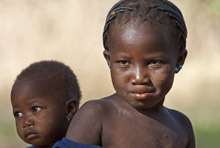
Typical street scene in Santa Ana, El Salvador. (Photo: iStock)
IMF Survey : Social Safety Nets Key to Helping Poorest in Burkina Faso
February 11, 2013
- African policymakers focused on policies to protect the most vulnerable
- Burkina Faso committed to comprehensive safety net system
- IMF and partners helping to develop and advocate for targeted welfare programs
The IMF is working with Burkina Faso to develop targeted welfare programs aimed at identifying and helping the poorest, but these programs remain a work-in-progress for a country dealing with chronic poverty and an influx of refugees from neighboring Mali.

Children in Banfora, southwest Burkina Faso. In the past, social safety nets in the country were fragmented and failed to target the poorest (Photo: Marcell Claassen/Corbis)
WELFARE PROGRAMS IN AFRICA
In Burkina Faso, as in many other countries in sub-Saharan Africa, social safety nets—which can range from cash transfers to individuals for food, education, or health needs, to public works programs that create employment—have been playing an increasing role in protecting the most vulnerable.
In an interview with IMF Survey, Isabell Adenauer of the IMF’s African Department explains why these safety nets are so essential to a country like Burkina Faso.
IMF Survey: Why does Burkina Faso need safety nets?
Adenauer: The country suffered a series of shocks, which started in 2008 with a food and energy price shock. Later, the country was hit by floods, a drought, and suffered from social unrest. Typically, what happens in these circumstances is that the poor are hit first.
On top of this, the country had to absorb more than 100,000 displaced persons from Mali who are, in turn, hit disproportionately by these shocks. Therefore, I think there is a great need in sub-Saharan Africa to protect the most vulnerable.
The Bretton Woods institutions, and particularly the IMF, are realizing that generalized or universal subsidies are often not very well targeted, and are not good instruments to reach the poor. Recently, there has been a strong interest in developing better-targeted programs.
IMF Survey: How would you describe the current state of social safety nets in Burkina Faso?
Adenauer: I can refer to a study on social safety nets in Burkina Faso recently conducted by the World Bank. It found that there is already a very large number of individual programs. However, these programs are very fragmented, not very well targeted to the poor, not comprehensive, and do not have a coherent approach to them. Moreover, they are quite costly.
The Burkina Faso government has asked for help from the IMF, and particularly the World Bank, to design a more comprehensive and cohesive social safety net system. This new system tries to identify the poor directly, then transfer monies to individuals in need, rather than disbursing funds through universal subsidies.
IMF Survey: Can a country like Burkina Faso afford social safety net programs?
Adenauer: It is often said that poor countries are not equipped, both financially and logistically, to handle cash transfer systems. Many people think that these systems are too costly. However, it actually works the other way around.
For example, if a government can afford to pay ½ percent or 1 percent of gross domestic product, then they can set up a program accordingly, targeting, say, the poorest 10 percent of the population.
IMF Survey: Are there any other sort of challenges that Burkina Faso is facing in this respect?
Adenauer: Identifying the poor directly is not always an easy task, but different techniques are available.
In Burkina Faso, they used what is called a “proxy means” approach, where representatives go out to local homes to conduct surveys using a list of indicators including, for example, household belongings, properties owned, and other similar indicators to get an estimate of household incomes.
While it is generally believed that collecting such information is very difficult to do in Africa, what we have seen is that it works quite well. So, I believe it can be done. In fact, it has been quite successful.
IMF Survey: Have these programs actually helped toward more poverty reduction in the country?
Adenauer: That is what we believe. Unfortunately, at this time we do not have many evaluations available.
There was one evaluation done by the World Bank on the cash transfer system for the urban poor that was set up in 2009/2010, which was very positive. So, we believe that these programs have a very favorable impact, and can help reduce poverty.
IMF Survey: Finally, what role do international institutions, such as the World Bank and the IMF, have, or can have, in helping countries establish or maintain social safety nets?
Adenauer: I think the World Bank, given its mandate, is much better placed to help countries establish or maintain social safety nets, but I see the IMF’s role as complementary.
We have a group in the IMF’s Fiscal Affairs Department that has the expertise to conduct so-called poverty and social impact analysis of individual policies, which is usually the first step. Such an analysis was done in Burkina Faso in 2000, to look at the instruments available to the government to protect the poor from adverse shocks—at that time there was the adverse food and energy price shock. We can continue to do that type of analysis for these countries.
Moreover, the IMF usually examines the level and composition of expenditure in detail. Therefore, it can help the Burkina Faso government to find the fiscal space needed to finance these programs.
Finally, to my great surprise, I saw that in several African countries, the authorities themselves are not convinced that these schemes can work. Often, they fear that the funds will not reach the intended users. So, the IMF can also help to advocate social safety nets, as we did in Burkina Faso.


